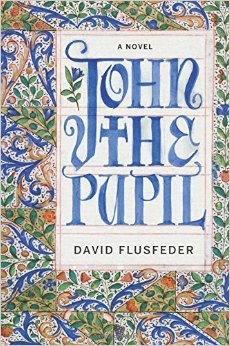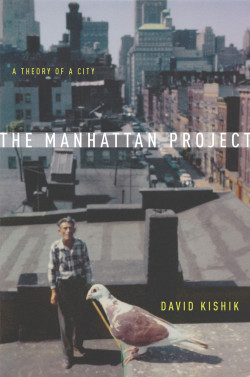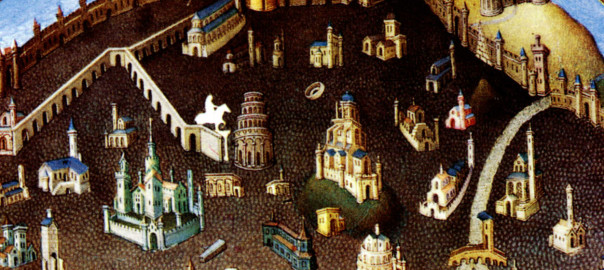Podcast: Play in new window | Download
Subscribe: Apple Podcasts | RSS
David Flusfeder discusses his novel, John The Pupil. It’s about a medieval journey that prefigures the Renaissance era to come. And then another work of fiction that reimagines a historical figure:Â urban philosopher David Kishik talks about his book, The Manhattan Project. It imagines what Walter Benjamin would have written about New York had he succeeded in escaping to the US from Nazi-dominated Europe.
David Flusfeder
 Historical novels face some challenges that fiction based in contemporary reality doesn’t. They have to get their historical facts right and paint a convincing picture of the society within which they are set. And that’s what most good historical novels do. But often their characters speak in an anachronistically modern voice, which fails to capture how people in earlier centuries actually thought.
Historical novels face some challenges that fiction based in contemporary reality doesn’t. They have to get their historical facts right and paint a convincing picture of the society within which they are set. And that’s what most good historical novels do. But often their characters speak in an anachronistically modern voice, which fails to capture how people in earlier centuries actually thought.
In his new novel John The Pupil, David Flusfeder succeeds where so many other historical novels fail. In the book’s eponymous main character, he creates a compelling voice that seems to come to us directly from the 13th century.
John is a young a friar who has been charged by his teacher, the great natural philosopher Roger Bacon, with bringing the latter’s magnum opus to Pope Clement IV at a time when both Bacon and the Pope were battling powerful enemies.
Young John the Pupil’s journey is a perilous one. Along the way he encounters not only only the predators of the medieval road but also temptations and moral dilemmas. As his mettle is tested, he traverses not only national boundaries but also the boundaries of the medieval society he’s grown up in to imagine greater choices for himself as an individual.
In addition to John The Pupil, David Flusfeder is the author of six previous novels, including The Gift.
David Flusfeder is the author of six previous novels, including The Gift. He has also written film scripts and is working on an opera.
Read an excerpt from John The Pupil Â
David Kishik
 When the German philosopher Walter Benjamin committed suicide on the French-Spanish border in 1940, he left behind one of the most brilliant and idiosyncratic cultural critiques of a city the world has ever known. Unfinished at the time of his death, The Arcades Project was a massive collection of notes about Paris — filled with penetrating insights, fragmentary analyses and vivid descriptions of the city in which Benjamin spent the last 13 years of his life.
When the German philosopher Walter Benjamin committed suicide on the French-Spanish border in 1940, he left behind one of the most brilliant and idiosyncratic cultural critiques of a city the world has ever known. Unfinished at the time of his death, The Arcades Project was a massive collection of notes about Paris — filled with penetrating insights, fragmentary analyses and vivid descriptions of the city in which Benjamin spent the last 13 years of his life.
Walter Benjamin killed himself in despair on finding the Spanish border temporarily closed when he was trying to flee Nazi occupied France and make it to New York City, where he had obtained a visa to teach at the New School.
But what if he faked his suicide? What if he actually made it to New York? And what if he continued his investigations of urban philosophy by pursuing a “Manhattan Project” like The Arcades Project about Paris?
That’s the thesis of David Kishik’s new book, The Manhattan Project: A Theory of A City. The book is a scholarly study of an imaginary text by Benjamin about New York. An urban philosopher himself, Kishik examines the city through the lens of Benjamin’s sensibility — for lovers of New York, Walter Benjamin, Jane Jacobs and urban philosophy in general, it is a fascinating exploration of Manhattan as the capital city of the twentieth century.
David Kishik teaches in the Institute for Liberal Arts and Interdisciplinary Studies at Emerson College. He is also the author of Wittgenstein’s Form of Life and The Power of Life.
Hear the extended interview with Kishik
Read an excerpt from The Manhattan ProjectÂ
00:27:46 to 00:28:16

